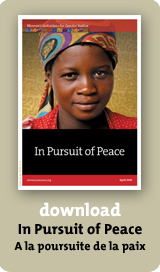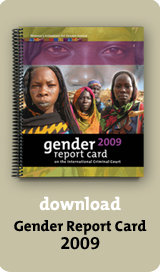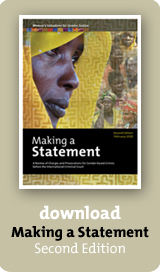E-letter July 2010 |
||
 |
||
In this issue |
Dear Friends,Welcome to a special issue of Women's Voices on two major events for the Women's Initiatives for Gender Justice in the past three months: the International Gender Justice Dialogue in Puerto Vallarta, Mexico (20-21 April 2010), and the participation of our delegation of 35 women's rights and peace activists, the largest NGO delegation, at the ICC 10-year Review Conference in Kampala, Uganda, held 31 May to 11 June 2010. In addition to Women's Voices, we also produce a regular legal newsletter, Legal Eye on the ICC, with summaries and gender analysis of legal developments, judicial decisions, announcements of arrest warrants and victims' participation before the Court, particularly as these issues relate to the prosecution of gender-based crimes. With both online e-letters we will also update you about the programmes, legal and political advocacy, campaigns, events, and publications of the Women's Initiatives. More information about the work of Women's Initiatives for Gender Justice and previous issues of Women's Voices and the Legal Eye can be found on our website at www.iccwomen.org. International Gender Justice Dialogue, Puerto Vallarta, Mexico, 20-21 April 2010On 20-21 April, the Women's Initiatives for Gender Justice in collaboration with the Nobel Women's Initiative hosted the International Gender Justice Dialogue, a global, strategic conversation to advance gender justice through peace processes and strengthen accountability for gender-based crimes with a focus on situations of armed conflict and fragile states. The Dialogue was attended by 50 participants from 16 countries, including leaders from the fields of international criminal law, representatives of the International Criminal Court (ICC), Nobel Laureates, peace activists, women's rights advocates, United Nations personnel, crisis-response organisations, academics, communications specialists and donors. Initially scheduled for 19-21 April in Puerto Vallarta, Mexico, the Dialogue agenda was readjusted to allow participants whose flights were affected by the eruption of volcano Eyjafjallajokull in Iceland to arrive in Puerto Vallarta. Unfortunately, due to the major global flight interruption caused by the volcano, 30 of the 80 invitees were prevented from attending the Dialogue. However we facilitated alternative means for participation and some were able to provide their presentations via skype or contribute to the discussions by recording video messages, or sending statements for inclusion in the working group discussions. In her opening speech, Brigid Inder, Executive Director of Women's Initiatives, gave an overview of the context of the gathering, describing the state of global criminal accountability for violence against women in armed conflicts, the implementation of the UN Security Council resolutions on women, peace and security, and the work of the ICC. All these elements, she said, create the context in which participants to the Dialogue gathered with the aim of contributing to a three-year global agenda to advance gender justice and women's rights through the use of accountability mechanisms and access of women's rights advocates to peace negotiations and implementation of peace agreements. During the Dialogue, the Women's Initiatives also launched In Pursuit of Peace / A la poursuite de la paix, a new bilingual publication that includes statements, documents, and calls to action from women peace activists in relation to three countries emerging from, or still held captive to, armed conflict: Uganda, the Democratic Republic of the Congo (DRC), and the Central African Republic (CAR). Despite the unexpected disruption caused by the volcano, the Dialogue succeeded in bringing together diverse voices to identify challenges, share successes, and create new strategies towards gender justice. Discussions covered a range of topics including strategies and challenges for integrating women and gender issues within peace talks, the necessary advances in jurisprudence and access to prosecutions in relation to gender-based crimes, and mandates and opportunities to engage with other sectors working in situations of crisis and armed conflicts. Three working groups — on Justice and Jurisprudence, Peace Talks and Implementation, and Communicating Gender Justice — identified priorities for advancing gender justice through accountability mechanisms, including the ICC, as well as through influencing the frameworks, instruments and outcomes of peace negotiations. These priorities will contribute to the foundation of a Global Agenda for Gender Justice over the next three years. Read the English, French and Spanish original programme of the International Gender Justice Dialogue. Read the English, French and Spanish concept paper of the International Gender Justice Dialogue. Global Agenda to Advance Gender JusticeAlong with the International Gender Justice Dialogue, the development of a three-year global agenda to advance gender justice will be informed by a range of other meetings, consultations, advocacy and programmatic initiatives. These include:
Over the coming months we plan to conduct a small number of additional consultations as we finalise the three-year global agenda. Beyond the Dialogue and the first global agenda, the Women's Initiatives for Gender Justice is making a 10 year commitment to the process of global movement and constituency building and the ongoing development of a collective vision including identifying strategies, innovations and initiatives to advance gender justice. In the course of this decade's work we envisage holding an International Gender Justice Dialogue every three years, as well as thematic and regional Dialogues in the intervening periods as we fine tune and evolve the articulation of strategies and opportunities to progress justice for women, expand the size and scale of the global movement and deepen the capacity of advocates around the world to advance gender justice. We will provide ongoing updates about the Global Agenda through our website and regular e-letters. Review Conference of the Rome Statute of the International Criminal CourtFrom 31 May — 11 June, the Women's Initiatives for Gender Justice participated in the Review Conference of the Rome Statute of the International Criminal Court, in Kampala, Uganda. The Women's Initiatives delegation included 35 women's rights and peace activists from Uganda, Central African Republic, Democratic Republic of the Congo, and Sudan. During the two weeks of the Review Conference, we organised a series of events including an all-day Women's Court, press conferences, and a reception for the African launch of our latest publicaton, In Pursuit of Peace / A la poursuite de la paix. At a press conference on 31 May we launched Advancing Gender Justice — A Call to Action. Joining Women's Initiatives' Executive Director Brigid Inder at the launch were women's rights advocates including several from conflict situations under investigation by the ICC. Panellists included Gladys Oyat of the Greater North Women's Voices for Peace Network, from Kitgum, Northern Uganda; Jeanine Bandu, Director of EFIM (Collective of Indigenous and Vulnerable Households), from Goma, Eastern DRC; and Albertine Tonnet, Coordinator of the Women's Section of the United Trade Union, from Bangui, Central African Republic and Susannah Sirkin, Deputy Director of the US-based NGO Physicians for Human Rights, also offered her reflections on the Call to Action. In the Call to Action, the Women's Initiatives outlines priorities for advancing gender justice through the ICC, as well as regional and national judicial systems. These priorities emerged from our country-based programmes and partnerships, advocacy initiatives with the ICC and consultative events in the lead up to the Review Conference. On 1 June the Women's Initiatives organised an all-day Women's Court, an advocacy event that drew attention to the particularised harms women and girls experience during armed conflict and that crimes against women continue to be under-investigated and prosecuted. The four sessions of the Women's Court, each focusing on an ICC situation country, were moderated by experts including Nobel Peace Laureate Wangari Maathai; Silvana Arbia, Registrar of the International Criminal Court; Bukeni Waruzi, Lead Campaign for Gender-based Violence at Witness; and Elisabeth Rehn, Chairperson for the Board of Directors for the ICC Trust Fund for Victims. Judge Sang-Hyun Song, President of the International Criminal Court, also attended the event and delivered some remarks recognising the important and effective contributions that women's advocates made towards including gender provisions in the Rome Statute and affirming that 'the Court and the ASP must continue to build on and live up to the legacy [women] have created' and to 'take care to listen to the voices and concerns of women and of organisations like the Women's Initiatives'. The 12 panellists from Uganda, CAR, DRC and Sudan shared their experiences and analysis of the impact of armed conflicts on women, their desire for accountability for perpetrators of gender-based crimes, their hope in the ICC to deliver on its promise of justice, and the specific challenges they face in their work for justice, peace, and reconciliation. While affirming the importance of the ICC as a mechanism for accountability, activists and victims/survivors also expressed frustration over the delay in trials, impunity within their own countries, failure of governments to execute arrest warrants and cooperate in other ways with the ICC, harassment and threats by their governments against women's and human rights defenders, the need for accountability for those who are financing and supporting conflicts including through the sale of arms to conflicts in Africa, and lack of information about the Court's role in bringing justice and peace. The press conference held on 4 June featured women's rights and peace activists from four conflict situations who spoke about the urgent need for justice through international and national accountability mechanisms, the risks and challenges still faced by victims and affected communities and of the importance of including women as key stakeholders and partners in peace talks and in the implementation of peace agreements. Together with Women's Initiatives' Executive Director, Brigid Inder and Programme Officer, Amira Khair, the press conference heard presentations from Jane Akwero Odwong, Chairperson of the Greater North Women's Voices for Peace Network, from Kitgum, Northern Uganda; Claudine Bela Badeaza of Parlons SIDA, from Kisangani, Oriental Province, eastern DRC; and Bernadette Sayo, Minister of Social Affairs and the Family and President of OCODEFAD (Organisation pour la Compassion et le Développement des Familles en Détresse), from Bangui, CAR. Footnote1 The Forum, organised by the Women's Initiatives for Gender Justice, 6-8 October 2008, in Kampala, Uganda brought together 155 women's rights and peace activists, predominantly from the conflict situations under investigation by the ICC. This meeting provided the opportunity for women directly affected by the conflict situations before the ICC to reflect on the work of the Court in providing accountability, contributing to local expectations of justice, an end to conflict and impunity and the interface of the ICC with concurrent peace initiatives and processes.
|
|||
Women's Initiatives for Gender Justice • Anna Paulownastraat 103 • 2518 BC The Hague • The Netherlands Tel +31 (0)70 302 9911 • Fax +31 (0)70 392 5270 • info@iccwomen.org • www.iccwomen.org |
||||



